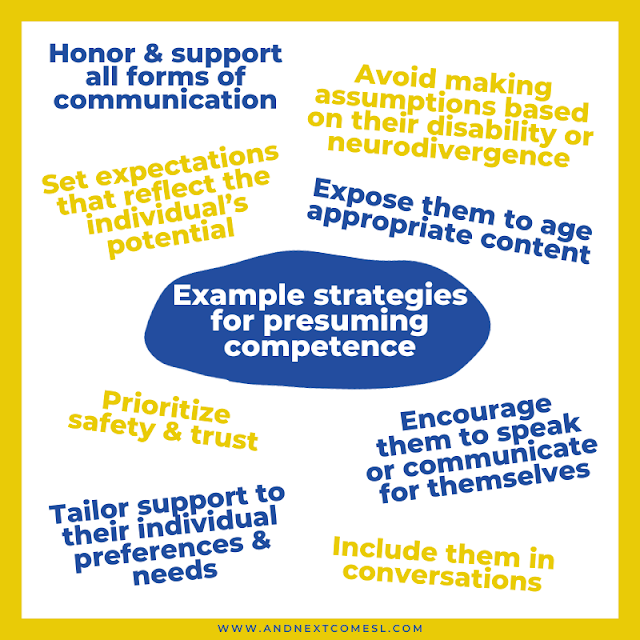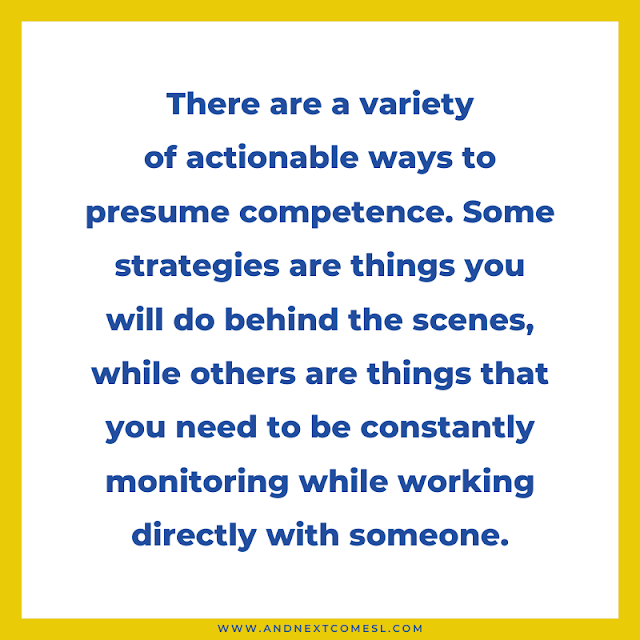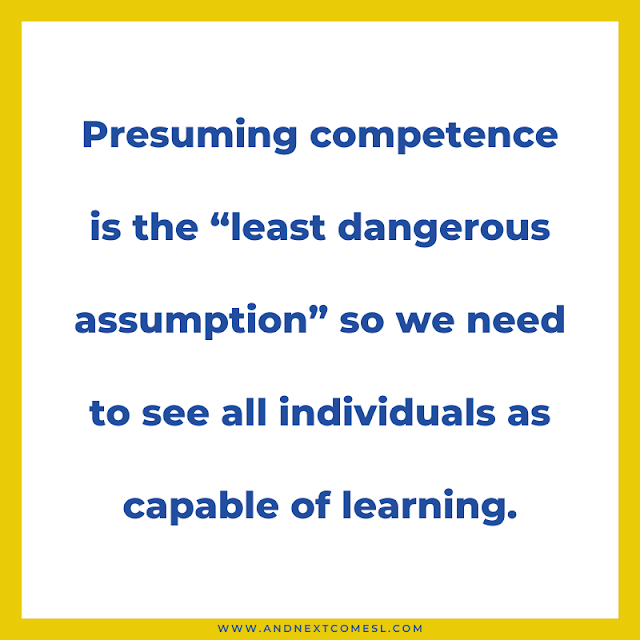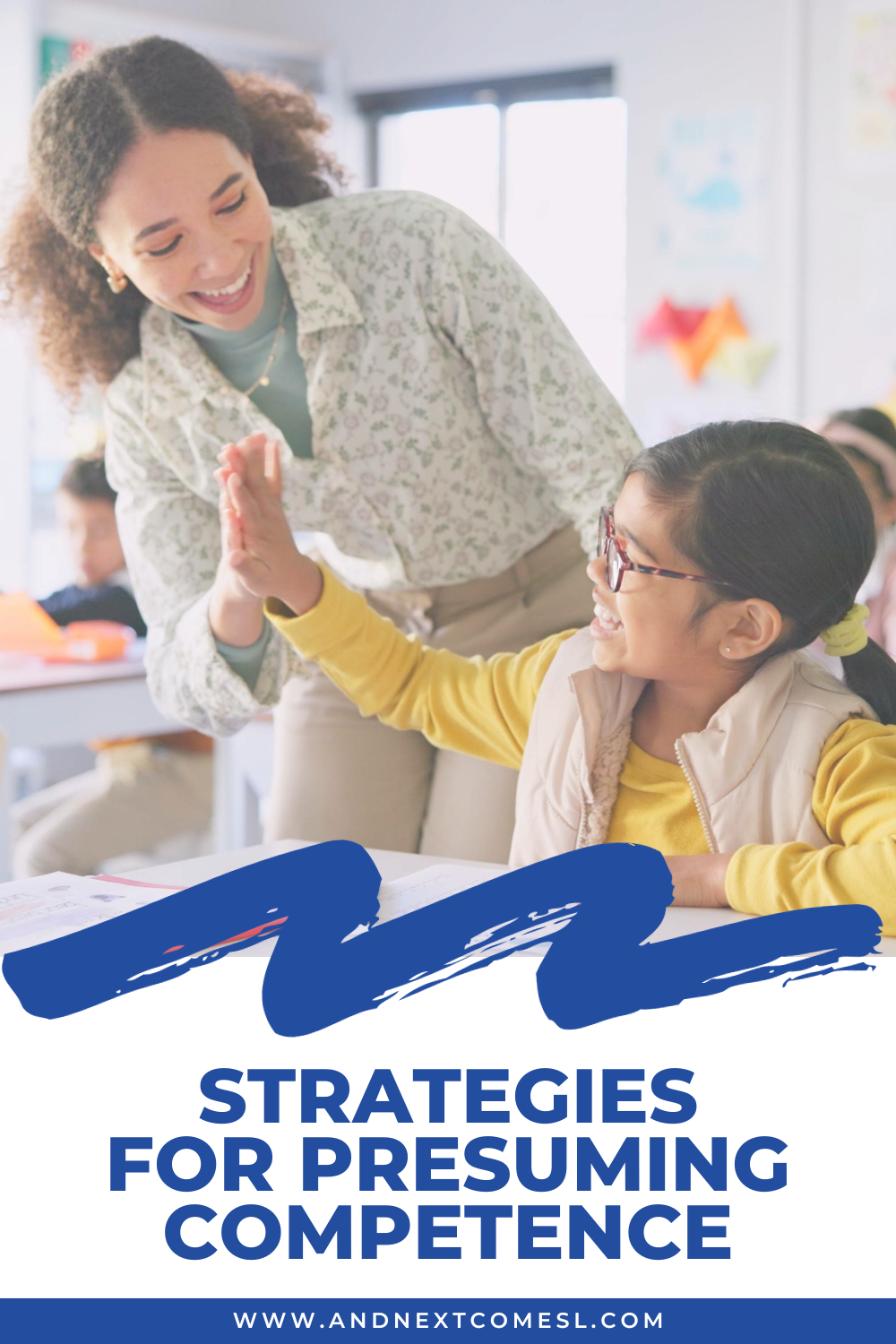A phrase that you might hear a lot in special education, speech therapy, or AAC circles is presumed competence.
But knowing what presumed competence means and why it's important is one thing.
On the other hand, knowing how to put it into practice is a whole other thing.
Perhaps you already know the basics of what presuming competence means and maybe you're like, "Okay, it all sounds great and all, but now what?" What are some actionable things that you can actually do? Where do you start? What should you avoid doing? How can you advocate for inclusive education settings? Those are the kinds of questions that we're going to explore and answer below.
Specifically, we're going to look at some tips and strategies for presuming competence in a wide variety of settings. That might be at home, in therapy, in special education or a general ed classroom, or somewhere else entirely.
Think of these ideas as a bit of a checklist of sorts to make sure you're doing what you need to be doing to best support a wide variety of individuals and accommodate a wide array of abilities. Building inclusive educational settings and classrooms is always important. So let's dig in!
Tips & Strategies for Presuming Competence
Please note that the following list of tips is pretty thorough. So, you might find all of this information about presumed competence overwhelming. Remember, you can always start with one or two strategies first and then go from there.
Keeping that point in mind, let's take a look at some of the actionable things that you can do when it comes to presuming competence:
- Speak to them normally and in age appropriate ways (e.g., avoid baby talk and over simplified language, consider tone and speed, use age appropriate vocabulary)
- Honor and support all forms of communication (e.g., gestures, AAC, pictures, spelling, sign language) and find ways to help an individual communicate
- Adapt your own communication styles and be flexible (e.g., modeling scripts and gestalts, modeling on a communication device, acknowledging echolalia)
- Encourage them to speak or communicate for themselves (e.g., do not speak for them, teach them self advocacy skills, provide extra time for them to process and communicate - see the power of waiting)
- Acknowledge them like you would any other person
- Include them in conversations (i.e., do not speak about them in front of others as if they aren't there and instead talk directly to them)
- Take a strengths-based approach and focus on what they can do (there's often too much focus on what someone can't do, which can lead to viewing some individuals as incapable)
- Respond to and acknowledge all attempts to communicate (a simple nod or yeah can go a long way, even if you aren't sure what they are trying to communicate - especially important for our gestalt language processors)
- Tailor support to their individual needs and preferences vs. tailoring them to the disability or diagnostic label
- Shift your mindset and attitude to make sure that you're setting them up to succeed rather than assuming they will just fail
- Focus on an individual's abilities and needs instead of describing them using functioning labels or by developmental levels (i.e., avoid referring to someone as high-functioning or low-functioning and instead say concrete things like "they can read at a 5th grade level" or "they find visuals helpful")
- Avoid making assumptions about what they can or can not do based on their disability, neurodivergence, or diagnosis
- Reject and question stereotypes, consider your own biases, unlearn harmful practices, and reserve judgment
- Keep learning about best practices related to disability, neurodiversity, and related topics in order to continue to improve support and inclusivity. Doing so will also help you with the previous bullet point. (e.g., read books by disabled and neurodivergent authors, stay up to date on the latest research and best practices, follow disabled and neurodivergent creators on social media)
- Use respectful and inclusive language (e.g., opt for neurodiversity affirming language and avoid deficit language)
- Ask for permission before offering assistance or sharing information with others (i.e., respect their privacy and their boundaries)
- Resist the urge to withhold information out of fear that they might not grasp it or understand it (i.e., if you would share it with any other child/person, share it with them too)
- Recognize that they might not be able to demonstrate what they truly know or understand (i.e., there could be a big gap between what they understand and what they are able to show that they know - especially when it comes to standardized tests)
- Expose them to age appropriate content like you would anyone else their age
- Observe an individual's behaviors, actions, and expressions and try to determine what those behaviors might be trying to communicate (e.g., yelling or hitting when they are feeling overwhelmed or anxious)
- Offer them a variety of opportunities to demonstrate their skills, abilities, and talents
- Provide choices for how they can demonstrate their skills, abilities, and talents (e.g., typing out an assignment vs. handwriting it)
- Provide appropriate educational supports and accommodations that will help an individual reach their full potential
- Use their strengths to encourage the individual to show their understanding (e.g., for hyperlexic learners, that means relying on written language vs. just spoken)
- Recognize that standardized tests have limitations and may not accurately capture an individual's true abilities or potential (the book Drawing a Blank touches on this issue in relation to hyperlexia and comprehension)
- Set expectations that reflect the individual's potential vs. setting low expectations based on assumptions or stereotypes
- Prioritize safety and trust (e.g., follow the child's lead, don't withhold favorite objects, focus on connection over compliance, use trauma informed care or therapy)
- Advocate for inclusive environments and celebrate diversity (e.g., accommodate various abilities and sensory needs, use a variety of diverse books in the classroom, use neurodiversity affirming practices, reduce sensory triggers, celebrate differences)
- Be patient and remember that progress may take time (i.e., every individual develops at their own different pace)
Some Final Notes on Presuming Competence
As you can see, there are a variety of actionable ways to presume competence on this list. Some of these strategies are things that you will do behind the scenes. For instance, shifting your mindset or continuously learning. However, a bulk of them are things that you need to be constantly monitoring - in the moment - while working directly with someone.
You'll also notice that some of these tips for presuming competence will be relatively easy to do, such as speaking to kids in age appropriate ways. And others might require a lot more work and patience, such as unlearning harmful practices.
It's also a good idea to consider these strategies and tips during IEP meetings as well. After all, they can be a great way to guide educational goals and outcomes. So, be sure to discuss them with the special education teacher, resource teacher, general education teachers, and other support staff on the IEP team.
Speaking of which, presuming competence is something that all members of the IEP team should be on board with. Unfortunately, that's not always the case. So, sometimes a lot of advocacy might be required to get the team on board. In this case, you might have to start small or simple.
It's also especially important to keep these tips in mind when it comes to working with individuals who are nonspeaking or have limited verbal communication skills. Too often, they are presumed incapable of learning or understanding and that's simply not the case.
Remember, presuming competence is the "least dangerous assumption" (source) so we need to see all individuals as capable of learning.
Now, will you make mistakes along the way? Absolutely! You're human after all. No one expects you to be able to master all of these overnight. So keep the last tip about presuming competence in mind for yourself: be patient and remember that progress may take time. Having a growth mindset will also help tremendously.
Good luck incorporating these strategies for presuming competence into your teaching, your therapy sessions, your parenting, and so on. Your efforts and your dedication to learning, growing, and doing better are much appreciated.






